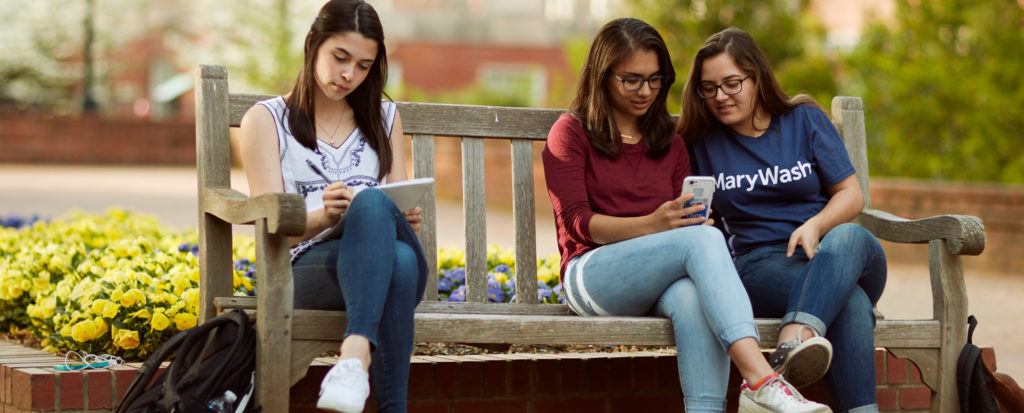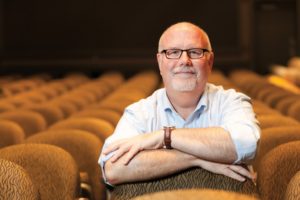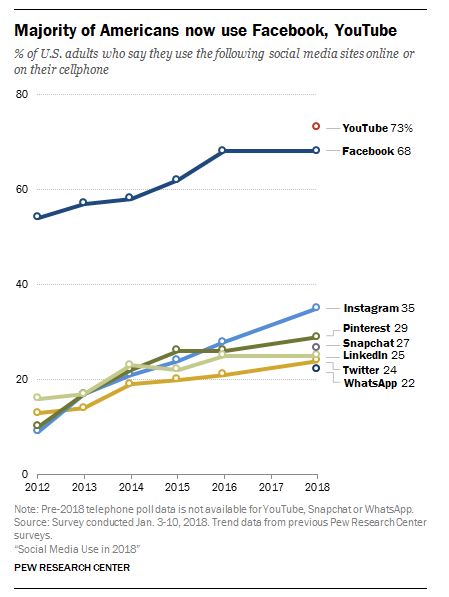The social media apps lined up on her smartphone – Facebook, Instagram, Twitter – and that is where the UMW senior often found herself, like so many others, whether by proximity or habit.
Inevitably, Angel Cowen ‘18 compared her own life to the ones she saw on screen. She knew it was unhealthy and time-consuming, an unrealistic lens through which to see the world. She hadn’t even seen some of the people she followed in years. But give it up?
-

After a reading assignment that suggested smartphones — and social media — were destroying a generation, several students decided to try to go without.
A reading assignment in a theatre class that linked depression to smartphones inspired her and others to try.
The article they read in an Ideas in Performance course had recently appeared in The Atlantic, adapted from a book title as loaded as it was lengthy: iGen: Why Today’s Super-Connected Kids are Growing Up Less Rebellious, More Tolerant, Less Happy—and Completely Unprepared for Adulthood—and What That Means for the Rest of Us.
The author, who’d been researching generational differences for 25 years, found that today’s teens were more depressed, more likely to take their own lives and “on the brink of the worst mental-health crisis in decades.”
Much of that, the author wrote, “can be traced to their phones.”
There was more: Today’s teens rarely spent face-time with friends because they were always connected online. Consequently, they were less likely to date, to drink, to have sex, to be crime victims. They were less likely to get their driver’s licenses at 16. Why would they, when they weren’t going anywhere?
“So what are they doing with all that time?” the author asked. “They are on their phone, in their room, alone and often distressed.”
On a Wednesday night, inside a duPont Hall classroom this spring, Theatre Department Chair Gregg Stull asked his students what they made of all that. He asked them why they thought he assigned it to them.
-

Theatre Department Chair Gregg Stull’s reading assignment asked whether smartphones were destroying a generation. Not everyone agreed.
Most were in their early 20s, so-called cuspers – wedged between the millennial generation and the generation the author described. They could remember a life before social media. Some could remember when the Internet came to their houses for the first time, via dial-up.
Cowen remembered that. She remembered wanting a MySpace account like her parents and older brother.
“If I wanted to tell people what happened,” Cowen said, “I called my mom instead of posting on Facebook. It improved my connection with my family. I was happier.”
Still, adults her age are voracious users of social media – nearly nine in 10 18- to 29-year-olds use some form of it, according to a Pew Research Center survey published this year. Adults in general are finding it harder and harder to live without. Just four years ago, 28 percent said social media would be tough to give up. Now that stands at 40 percent.

But some students weren’t buying it. Every new thing since the beginning of time had supposedly ruined a generation, a handful of them said, and yet here we were.
It wasn’t all bad, not for everyone, including Cindy Wang ’18, a theatre major from Houston who said social media nearly saved her.
“I went through a traumatic experience. I didn’t tell anyone for a really long time,” she said. “I spent a lot of time on the internet because I didn’t know where to go.”
It was there that she read a story similar to her own – and watched the overwhelming support from social media pour in. Soon, Wang started sharing her experience with others online. That ultimately gave her the courage to reach out to her own family and friends.
Claire Crusott ’18 wound up on social media the moment she got bored. Or there was a lull in the conversation. Even with the person right in front of her.
The Kentucky native hadn’t thought much about it, until the reading assignment.
Stull was on a trip to Italy when he realized how dependent he was on his smartphone. “I lost reception,” he told his students. “My whole life was right there” in a useless rectangle of aluminum. “It wasn’t a good thing.”
He came to realize the smartphone wasn’t a bad thing, either. But, Stull told them, “folks your age have higher levels of depression and anxiety. If indeed it is tied to this thing, you have to be critical of it.”
Crusott was ready.
“I didn’t delete Facebook because I thought it was a terrible thing,” she said. “It was a recognition that if I was having dinner with people, I needed to be there with them.”
They reinstalled the social media apps on their smartphones. Cowen, Crusott and all the other students in the class inspired to try life without it. They had to, because their next assignment – a research trip to New York – required them to use Facebook and Instagram.
But it’s different now, they all say. They have become the critical consumers Stull hoped.
“I took my birthday off Facebook because I didn’t want 100 ‘happy birthdays’ from people who didn’t talk to me the other 364 days a year,” Cowen said. She also doesn’t use it nearly as much.
Still, she said, “I think I was happier when I didn’t use it at all.”
When Olivia Whicheloe ’19 reloaded Facebook and Instagram, the New Jersey native unfollowed everyone that didn’t add something positive to her life.
“I no longer dread going on Facebook,” she said.
Crusott jokes about the time she was waiting on a ride and reached for her phone – only to remember social media was no longer there waiting. For the first time in a long time, she watched people walking by. She took notice of the nice weather.
“I think,” she said, recalling that day, “that I will take it off my phone again.”
Well done Gregg. Great, that a teacher (you) cares enough about their students to point out something they really need to hear and know. i.e. the risks of choosing iPhone vs people. So many others will not! Keep up the good work!
Best, Peggy James, Theater Major ”97
I’m a ’68 class member and I have been on FB for 7 years. I actually only use it abt once a week and to say happy birthday or anniversary or express sorrow for a loss. I really hate it to some degree! I refuse to use twitter at all. I get enough of that on the news!
Good for these independent, thoughtful and courageous young people. Thanks for inspiring those of us in an older generation of MW grads! (decades before cell phones, but now way more dependent than I’d like to admit!)
After taking Social Issues last summer, I have learned there are more important factors that cause students and adolescence in general to be “less likely to date, to drink, to have sex, to be crime victims” and more likely to have depression these days and social media is among those factors but it is not the central cause. I do believe that Social Media can be harmful but to speak for adolescence, I know my limitations and my personality and my activity on social media does not have as much of an affect on my life as my friends, family, and peers do.